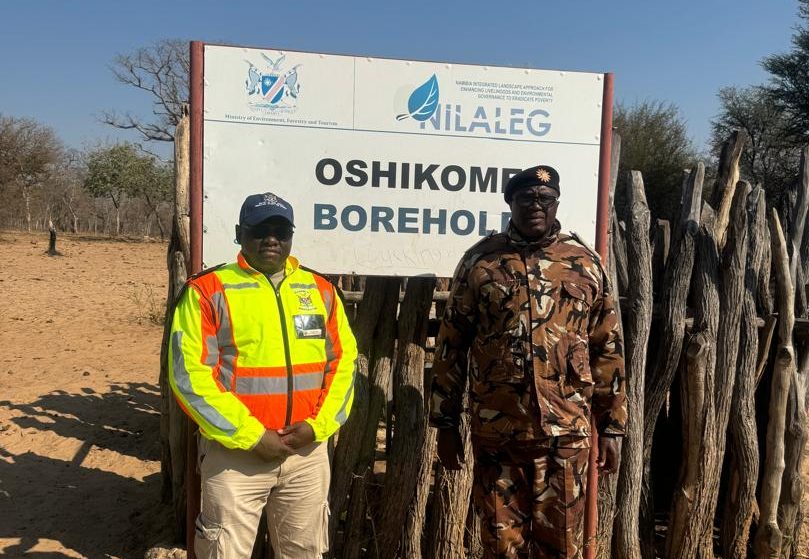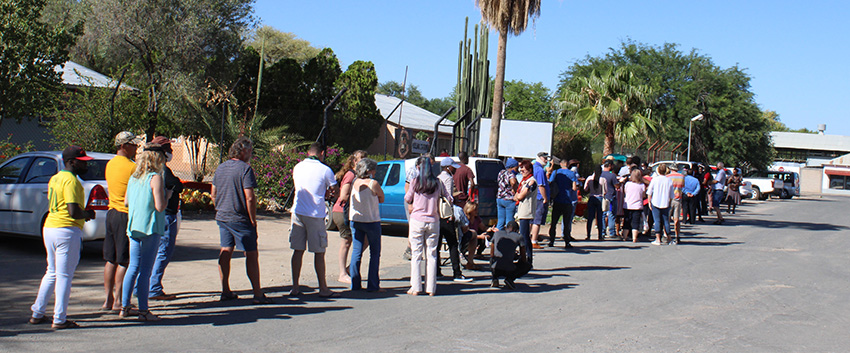A Trip to Namibia: We Are Amazed
Written by on May 17, 2024
Africa is uninvestable
There are a lot of stereotypes about Africa.
Most people assume that every country in Africa is poor, dangerous, and with a terrible economy.
Most investors – typically those who have never been to African countries nor met with African companies – would say that Africa is uninvestable, is in constant political turmoil, and is going through a currency meltdown on a daily basis.
We disagree with this blanket bias transposed on the entire African continent.
Same as not all 50 U.S. states are the same, and same as not all 40+ countries in Europe are the same, the 54 countries in Africa are not all the same. It is certainly true that some African countries have more issues than others – same as some states in the US or some countries in Europe have more issues than others. However, there are countries in Africa which can make an average Western country jealous, not only thanks to their beautiful nature, pleasant weather, and kind people, but also thanks to their stable political systems, enviable demographic growth (something long forgotten in Europe), and promising economic expansion prospects.
One such eye-opening example is Namibia, which we visited with a research trip for the first time since 2015. In theory, we – seasoned investment nomads who have made nearly 200 research trips and met with over 2,000 companies from over 30 emerging markets in the past decade – shouldn’t be surprised by any places anymore, let alone by a sparsely populated country of 3 million people living in southwestern Africa where the desert meets the sea. And yet, we were amazed by Namibia.
Did we board the wrong airplane?
Landing in Windhoek, Namibia’s capital city, was as tranquil as it gets: it was a nice sunny morning with pristine blue skies painted with a fine brush of the mother Earth on top of green bushes and dry riverbeds. It’s a divine pleasure to start a research trip like this, indeed. We quickly made it through friendly immigration at the functional international airport and embarked on a half-an-hour ride to the city.
During our ride to Windhoek on a perfectly smooth highway, we couldn’t help but ask: are we in Arizona? or Utah? – the landscapes looked so familiar to the places so close to our hearts. And as we approached the city, we couldn’t help but ask: are we in California? – the affluent design of properties and colorful vegetation tricked our minds to think we were in the Pacific Palisades in Los Angeles or La Jolla in San Diego, just without the ocean.
Navigating the safe, clean, groomed, modern streets of Windhoek, we then couldn’t help but ask: are we in Germany after all? – the street signs were in German, a lot of the architecture was German, the tallest church was Lutheran, many cars were German, and some of the residents looked like they were roaming the streets of Munich instead of savannah.
As we entered the modern office of the best Namibian investment brokerage, we noticed a variety of thick business newspapers lying around: they were in English, German, and a Southern African variation of Dutch known as Afrikaans. We had a closer look: all of them were locally printed!
We have to pause here and make a guess: this is not what most of our clients and readers would expect from one of the 54 “poor and dangerous” countries in Africa?
View of Windhoek, the tranquil and postcard-worthy capital of Namibia
Namibia 101 and the depressing winters
That a pharmacy in a Namibian town is named Adler Apotheke and that the street sign where it’s located says Kaiser Wilhelm Strasse surprises no locals but surely raises eyebrows of unassuming foreign visitors. The prevalence of German culture in Namibia’s largest cities is explained by the fact that it was one of Germany’s only colonies in Africa, with the first German settlers having arrived in the late 19th century. The colonial architecture, German language, Lutheran church, and German preference for Ordnung seem to have stuck around on the ground and remain prominent well into the 21st century.
Today, Namibia is one of the safest, most economically advanced and politically stable countries in Africa. It boasts well-functioning social institutions with a top-3 “least corrupt” rank in continental Africa, improving highway infrastructure, growing tourism industry, and young demographics.
70% of Namibians are younger than 30 years of age. The country’s population has more than doubled in the last 30 years – having expanded by over 40% in the last decade alone when the capital city Windhoek experienced a 50% population growth and the coastal towns Walvis Bay and Swakopmund both grew by over 60% – and the split between urban and rural population in Namibia is still at a nascent 50/50. All of this creates tremendous opportunities for local businesses addressing imminent urbanization, middle class expansion, and resulting consumption growth.
Namibia is also becoming more and more popular as a relocation and retirement destination for foreigners, particularly South Africans escaping their decaying institutions, as well as Europeans – primarily German speakers – escaping their depressing winters. The places along the coast such as the aforementioned booming Swakopmund and Walvis Bay – which we also enjoyed exploring on this research trip – are of interest to the newcomers due to their oceanic climate and lifestyle, while the capital Windhoek is attractive thanks to its high-quality yet affordable real estate and the developed services infrastructure including world-class private healthcare.
Riding the global work-from-anywhere trend, Namibia has also recently introduced a digital nomad visa, seeking to attract creative talent willing to explore the country for up to six months and spend money locally – thus benefiting the Namibian economy – while working online and not having to worry about taxes. A win-win for everyone.
A game changer
It is no coincidence that the U.S. recently opened a new state-of-the-art embassy building in Windhoek to replace the old one. Local rumour – which we could neither substantiate nor deny – claims that the new facility has capacity of up to 1,500-2,000 staff (a very substantial upgrade from the previous office’s 150) and will host a lot of diplomatic workers to be transferred to Windhoek from the embassy in Pretoria, South Africa’s political capital, making the embassy in Namibia the US’s regional diplomatic headquarters. Our guess is, security is one of the main motives behind the move as we had witnessed an alarming safety situation in Pretoria ourselves when after our meeting with South Africa’s central bank governor we were assigned a bodyguard and instructed not to exit the building until our car arrived. On the contrary, Windhoek appears very safe, calm, with a better-balanced lifestyle and with the same 2-hour flight time to one of the most beautiful cities on Earth – Cape Town.
Or, perhaps, if one would like a conspiracy theory for a delayed April Fool’s, the expansion of the US embassy might have to do with the fact that recently Namibia found very substantial oil reserves off its coast. What appears to be a complete long-term game changer for the country – according to our multiple conversations with the local business contacts who were all highly upbeat about it – this oil discovery can further solidify Namibia’s economy, improve its credit rating, help its businesses grow earnings, and might lead to a de-peg of the Namibian dollar from its South African counterpart.
From our analysis, stock markets of the countries which had newly found large oil reserves did particularly well following the initial five to ten years post-discovery – it is likely that Namibia will follow suit, especially given that its stocks are currently trading at very cheap valuations and an unexpected hugely favorably catalyst such as this oil discovery can quickly move the market.
Ringing the bell at the Namibian Stock Exchange!
Reaping the rewards at the Namibian stock exchange
Searching for hidden gems in Namibia, we met with the CEO of the local stock exchange, managing director of the best local brokerage, and the management of two most promising listed companies.
In our meeting with the stock exchange CEO, we learned an important technicality: in a favorable comparison with many other frontier markets (such as Bangladesh), there are no issues for foreign investors to get money in and out of the country as there are no capital controls and transactions are recorded and wired automatically. The exchange CEO explained to us that while there had been a slowdown in the economy since 2016, now business activity is picking up – and the recent oil discovery is only going make it hotter as it will lead to an improvement in the country’s creditworthiness, which will then drive an increase in investment, which will then drive growth in the entire economy.
In the stock exchange CEO’s view, given the current mismatch between the economy with upcoming rapid growth thanks to oil discovery on the one hand and the solid profitable companies whose valuations are “through the floor” on the other hand, investors that come to the market today might reap the biggest rewards of the future synchronization between the intensifying business growth and the valuations that will have to catch up. The sector that stands to benefit the most in the early stages of closing this gap is the banking sector – which is already “world-class” in Namibia – because it will facilitate the growth and investment throughout the entire economy. Banks that are already doing well will do even better, concluded the head of the exchange.
Big brother is not watching
Given that the banks are at the forefront of the looming economic boom in Namibia, we met with the CFO of the best local banking and financial services company which has already been performing well before the oil discovery and stands to do even better in the new oil era of the Namibian economy. A $450m business, it is the only pure Namibian-bred player among the top five banks in the market – the other four being subsidiaries of South African banking groups. We learned that while not having a “big brother” that could come to the rescue – a privilege its South African competitors have – could be seen as a disadvantage for this company, it actually forces it to stay conservative and maintain bulletproof balance sheet and risk management practices: when you go it alone you need to be so much better than everyone else in order to prevail.
We estimate that this bank can grow earnings by 20% or higher in the next 12 months, and its current valuation of 7x LTM P/E – a decade-low despite very strong earnings growth prospects for the next five years – looks like what the best broker in Namibia described as “jeez that’s a screaming buy”. We never generate investment ideas using brokers and always do our own research and analysis, and this time marked the rare occurrence when our views coincided with a broker’s.
What investors are misunderstanding about the company at the moment is that it is best-positioned to benefit from the upcoming economic upswing due to oil discovery. According to the management, the market is also not giving it enough credit for its investment in a local Namibian up-and-coming IT and telecom business which is poised to compete for market share with the incumbent telecom monopoly controlling 95% of the market. To better understand the prospects of this new telecom firm which the bank invested in with high conviction, we proceeded to meet with its management.
Spaceship disguised as a warehouse
Navigating to our meeting with the management of the $100m IT & telecom group, we stopped at a warehouse building on the outskirts of Windhoek. We were puzzled: according to the map, this is where the firm’s main office should have been located. After some visual research, we finally noticed a sign on the building with the company’s name on it. Relieved but suspicious, we went in.
What awaited us inside this unassuming warehouse was shocking. It was as if we entered a fantastic parallel universe dreamt up by some genius mind. The company’s office resembled a spaceship moving swiftly into the future, with a control room the likes of which we only see in the movies about aliens or spies where they monitor the entire world via dozens of high-tech screens. Having completed over 2,000 company meetings in the last five years, we are confident this company’s office ranks in our top-5 list of best corporate quarters.
The firm has created a very appealing culture to entice the local tech talent to stay in Namibia or come back home after education abroad. There is no rigid organizational hierarchy, but there surely is a fun working environment. Among the exciting amenities to make the staff happy, there is a pole for the employees to jump on and get straight from work on the upper floor to the kitchen on the ground floor (we tested and loved it), there is a bar to refresh and recharge the spirits (pun intended) with a real gasoline pump pumping drinks for the employees, and there is a garden to sit back and discuss groundbreaking ideas or simply relax. There is a special tradition to welcome new visitors to the firm’s premises: an intense alarm goes off, everyone gathers at the bar, and the newcomers have to do shots of some particularly burning liquid. We couldn’t help but abide by this rule and pretend that we fully absorbed all the liquidity this company offered to us.
The firm’s ability to attract and retain the best local talent is clearly working as it has been rapidly growing revenue and already provides services in 35 African countries. On its home turf in Namibia, it intends to compete with the cellular network monopoly by launching a new mobile operator using 5G capabilities – a welcome development for the quality of service in the local telecom market: under the status-quo monopolistic setup our local e-SIMs simply refused to function – they only worked for about 10 minutes out of our entire time in the country.
This meeting only cemented our optimism about Namibia. That a private high-tech telecom company managed to get off the ground, attract top talent and expand to three dozen countries, and aspires to compete with a monopoly is a testament to the quality of Namibian people making it happen and to the strength of Namibian institutions providing an environment for such high-value-add entrepreneurship to happen.
Long(ing) for Namibia
We went to Namibia to search for hidden gems. What we did not expect, and what we realized during our trip, is that Namibia itself is a hidden gem – one of a kind.
Namibia has all the potential to be known as a land of growth and prosperity rather than a Skeleton Coast for investors whose treasures may get lost in a shipwreck. In our view, it is only a matter of time that this market gets re-discovered by investors. It has growing businesses run by top teams, it has world-class governance, and it has a major catalyst that can drive long-term performance across all sectors of the economy.
Namibia also has a beautiful ocean and a fascinating desert, a great people with a curious mix of cultures, and a unique tranquil atmosphere to it which we truly enjoyed experiencing – when we do our research trips, we always try to spend as much time feeling the local vibe and sentiment as we do meeting companies. We believe it helps us better understand a country and its citizens.
We like to collect stories from the ground and share them with our investors – while we are not such elaborate writers and storytellers like Tolstoy or Hemingway and can’t collect as much material by flying full-time around emerging markets on a private jet like Mark Mobius did, we honestly leave a part of our souls in every place we visit and take a part of each place with us, the emerging markets traveling the world in search of hidden gems we are. To that extent, from now on we will always have a sense of fernweh for Namibia. Auf Wiedersehen – see you again, Namibia, the fine land where the desert meets the sea.
The post A Trip to Namibia: We Are Amazed appeared first on The Namibian.




